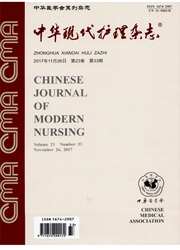

 中文摘要:
中文摘要:
目的调查低龄儿童半椎体切除术后患儿母亲护理知识认知情况及常见问题分析。方法对73例行半椎体切除术的低龄儿童患儿母亲进行问卷调查,了解其对患儿术后家庭护理知识的认知和在术后护理中常见问题,并分析其影响因素。结果73例患儿的母亲对家庭护理认知总分(23.9±4.5)分.其中对功能锻炼方面得分较低。不同文化程度、家庭经济状况、居住地以及是否接受出院前家庭护理知识教育的患儿母亲家庭护理认知得分不同,差异均有统计学意义(P〈0.05)。接受家庭护理知识教育的患儿其母亲生活护理(7.3±3.6)分、伤口护理(6.6±3.0)分、支具护理(7.9±2.4)分和功能锻炼(5.8±2.3)分,各维度得分均高于未接受培训的患儿母亲,差异有统计学意义(t值分别为2.1,2.3,3.0,3.3;P〈0.05)。患儿母亲在术后家庭护理中常见的问题包括生理问题和心理问题。结论患儿母亲护理认知程度受多方面因素影响,护理知识宣教在提高患儿母亲护理认知程度中起到重要作用,应加强功能锻炼方面知识宣教。
 英文摘要:
英文摘要:
Objective To investigate the cognition of home nursing knowledge and common problems of the mothers of children with hemivertebrectomy. Methods Questionnaire was used to evaluate 73 mothers of children with hemivertebra resection. Their cognition of postoperative home nursing knowledge and common problems were collected and its influencing factors were analyzed. Results The average cognition score of 73 mother's home nursing knowledge was (23.9+4.5) points, with a lower score in functional exercise cognition. There were significant differences in the score of cognition in mothers with different education, family economics, residence and whether received home nursing knowledge education (P〈0.05). Mothers who received home nursing knowledge education showed a higher cognition score in life nursing ( 7.3 ± 3.6) points, wound nursing (6.6±3.0) points, brace nursing (7.9±2.4) points and functional exercise (5.8±2.3) points ; the score of each dimension was higher than that of unreceived training (t= 2.1,2.3,3.0,3.3, P〈0.05). Meanwhile, those common problems that mothers often encountered included physiological and psychological problems. Conclusions The cognition of home nursing knowledge is influenced by various factors, and the propaganda of home nursing knowledge education plays an important role in improving the cognition of home nursing knowledge of those mothers. In addition, functional exercise knowledge training should be emphasized.
 同期刊论文项目
同期刊论文项目
 同项目期刊论文
同项目期刊论文
 Association of rs11190870 near LBX1 with adolescent idiopathic scoliosis susceptibility in a Han Chi
Association of rs11190870 near LBX1 with adolescent idiopathic scoliosis susceptibility in a Han Chi A novel mutation in COL2A1 leading to spondyloepiphyseal dysplasia congenita in a three-generation f
A novel mutation in COL2A1 leading to spondyloepiphyseal dysplasia congenita in a three-generation f Genome-wide association study identifies new susceptibility loci for adolescent idiopathic scoliosis
Genome-wide association study identifies new susceptibility loci for adolescent idiopathic scoliosis 期刊信息
期刊信息
